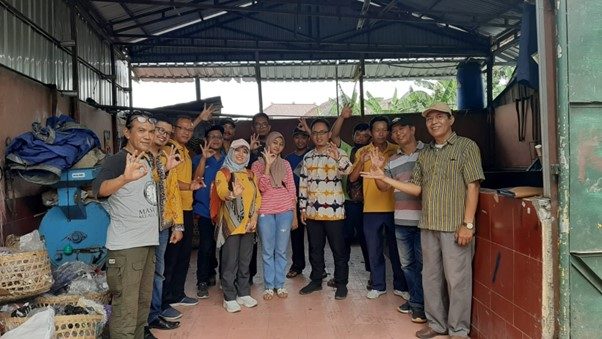On Thursday, October 12, 2023, the Organic Waste Management Task Force from the Faculty of Biology UGM visited Giwangan Market in Yogyakarta to survey the infrastructure capacity and waste volume for organic waste management efforts. The task force, led by Soenarwan Hery Poerwanto, S.Si., M.Kes., consisted of expert team members Sukirno, S.Si., M.Si., Ph.D., and Dwi Umi Siswanti, S.Si., M.Sc., along with task force members Suharjito and Danang. The team was received by Kelik Novidwyanto Wibowo, SE, the Head of TPS3R at Giwangan Market, along with Susilo and R. Dody Winardono, who oversees the market’s cleanliness under the Trade Department, and Agus from an NGO. This visit was a follow-up to the Tripartite meeting between the Faculty of Biology at UGM, TPS3R Giwangan Market, and SONJO, a Yogyakarta-based group currently focused on addressing the garbage emergency on October 6, 2023. These meetings were also attended by the Lestari NGO, Agus Hartono, and the Management of the Waste Bank Association in Yogyakarta, Mustakim. The visit began with the Head of TPS3R providing information about the volume of market waste and how it has been managed to date, the challenges faced, and plans for organic waste management.
Kelik mentioned that Giwangan Market has been producing around 2 tons of organic waste daily. Data on the management of organic waste at Giwangan Market since January 2023 shows a decrease in the volume of waste handled until September 2023. TPS3R Giwangan has been managing organic waste using biopores created around the market. The compost produced from these biopores takes a long time to decompose. The Organic Waste Management Task Force from the Faculty of Biology at UGM is offering a simple technology to handle organic waste, including the production of compost with the help of the Bioferti 2023 probiotic, making eco-enzymes from fruit waste, and producing POC (Liquid Organic Fertilizer) with the assistance of Black Soldier Fly larvae. Making compost from organic waste with the Bioferti 2023 probiotic formula from the Faculty of Biology at UGM has been proven to degrade organic waste in about 7 to 14 days, with organic fertilizer contents of N (2.70%), P (0.62%), and K (68.3%) meeting organic fertilizer standards.
During this visit, the task force provided 5 liters of Bioferti 2023 and committed to supporting the management of organic waste at Giwangan Market. Soenarwan Hery Poerwanto expressed, “TPS3R Giwangan Market is currently best suited to process organic waste into compost using the Bioferti 2023 application. Furthermore, infrastructure for maggot cultivation can be established as the next solution for waste processing, with maggot yields being marketable as fish feed. Also, fruit waste can be used to make eco-enzymes.” This was stated after the survey at TPS3R. The accompanying program by the Organic Waste Management Task Force at TPS3R Giwangan Market is part of the effort to realize Sustainable Development Goals (SDGs) 3 (Good Health and Well Being) and SDGs 11 (Sustainable Cities and Communities). Kelik added, “We hope that the Faculty of Biology at UGM and TPS3R Giwangan Market can establish a Cooperation Agreement as an elaboration of the Memorandum of Understanding (MoU) already in place between the Trade Department of the DIY Regional Government and UGM.”


